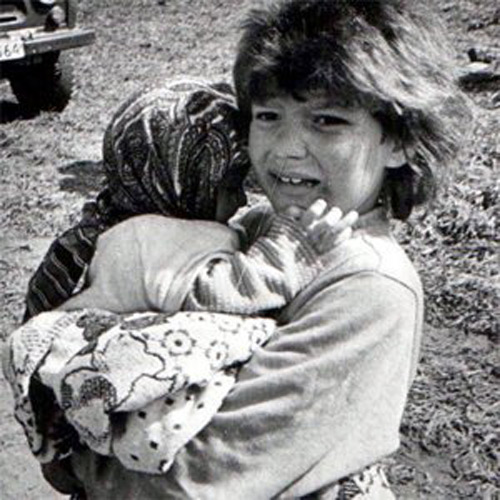On the 26th of February 1992, the war in Karabakh escalated to unprecedented levels and resulted in one of the greatest humanitarian catastrophes of the 20th century.
As Armenian soldiers attempted a final takeover of the town Khojaly it told inhabitants that if they evacuated they would be granted safe passage. The 2,500 remaining inhabitants of Khojaly (23,757 existed before the war) found themselves without phones, electricity, heating oil, water, or food and thus sought the safe passage they were promised. Instead, Armenian soldiers and members of the No.366 Soviet infantry regime were waiting at the border to gun them down.

As a result of this incident 613 people were killed, including: 106 women, 63 children, and 70 elderly. Of these deaths 487 were severely maimed, including 76 young children, and 56 were killed with severe cruelty – shot at close range, scalped, burnt alive, had their eyes gorged out, beheaded – one pregnant woman was even bayoneted in the abdomen. Those who escaped the gunfire only wounded had to trek through the mountains to safety and many perished in the cold. A further 1275 people were taken hostage.
Once all of the Khojaly inhabitants had been killed, taken prisoner, or escaped, Armenian soldiers quickly took control of the region, in part to manipulate the death toll to low numbers. Azerbaijani helicopters attempted to pick up the dead bodies but were continually fired at. Eventually most of the dead were brought home in vehicles, by the truckloads. However, the whereabouts of a further 150 people remain unknown. The massacre of Khojaly by Armenia violates Geneva conventions and articles 2, 3, 5, 9, and 17 of the Human Rights Declaration (adopted by UN General Assembly on Dec 10 1948).
Despite a flurry of international media coverage after the event validating the massacre and a number of human rights reports holding Armenia responsible, official Armenian accounts deny responsibility for the these crimes.
A national day of mourning takes place every year in Azerbaijan to commemorate the lives lost in the Khojaly Massacre, one of the darkest days in modern Azerbaijani history.
